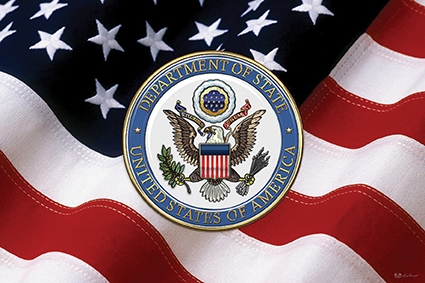US Department of State Report Says Orthodox Church Is Privileged in Georgia
The International Religious Freedom Report for 2016, released on Tuesday by the United States (US) Department of State, reads that the Orthodox Church is privileged in Georgia.
The report says that the Constitution of Georgia provides for “complete freedom of religion,” separation of Church and State, equality for all regardless of religion and also prohibits persecution on the basis of religion.
However, it says that “laws and policies grant the Georgian Orthodox Church (GOC) privileges not accorded to any other religious group, including legal immunity for the GOC Patriarch and a consultative role in education.”
The report reads that the Constitution recognizes the special role of the GOC in the country’s history, but stipulates the GOC should be independent from the State and relations between the GOC and the State should be governed by a constitutional agreement (also called a concordat).
It also says that besides the legal immunity for the GOC Patriarch, the concordat provides exemption of GOC clergy from military service, and a consultative role in government, especially in terms of education.
“The tax code considers religious activities not to be economic activities, and grants registered religious groups’ partial tax exemptions for donations. Religious groups other than the GOC pay profit tax on the sale of religious products, value added taxes on the provision or importation of religious products, and taxes on all activities related to the construction, restoration, and maintenance of religious buildings,” the US Department of State says.
Moreover, the report shows that the GOC is privileged in Georgia in terms of funding from the state budget.
“The government distributed GEL 25 million ($9.4 million) to the GOC in compensation for ‘the material and moral damages’ inflicted upon it during the Soviet period. In accordance with a 2014 resolution by parliament allowing the government to compensate Islamic, Jewish, Roman Catholic, and Armenian Apostolic religious organizations registered as LEPLs, the State Agency on Religious Issues (SARI) disbursed compensation funds totaling GEL 4.5 million ($1.7 million) to those four religious groups,” the report says.
The report reads that during the year, the government investigated 19 cases involving alleged crimes committed on the basis of religious intolerance, adding that Non-governmental organizations (NGOs) and the Public Defender’s Office (PDO) reported that a lack of effective investigations into crimes motivated by religious hatred remain a major problem.
“Some NGOs and the PDO said the government inadequately addressed acts of religious intolerance and discrimination, favoring the GOC in public schools,” the document says.
The US Department of State adds that despite the fact that the government opened the first mosque for members of the armed forces, only the GOC continues to have chapels in prisons.
The report also says that restrictions continue on religious activities in the regions of Abkhazia and South Ossetia, which remain outside the control of the central government.
The document reads that, according to SARI, de facto government authorities in the Gali district of Abkhazia reportedly did not permit GOC clergy to conduct religious services in any of the four GOC churches, and ethnic Georgians were unable to attend services in their own language.
The situation is the same in occupied South Ossetia. In three of the four districts of South Ossetia (Tskhinvali, Znauri, and Java), GOC churches have reportedly broken away from the GOC and merged with the Greek Orthodox Church.
“Individuals living outside Abkhazia and South Ossetia reported continued difficulties crossing into these territories, including for the purpose of visiting the gravesites of family members,” the report says.
The US Department of State says that the US Ambassador to Georgia regularly holds meetings with officials from the Georgian government, including SARI, the Prime Minister’s Adviser on Human Rights and Gender Equality, and the Georgian President’s Adviser on National Minorities, to encourage dialogue between the government and religious minorities.
The US Ambassador and embassy officers also meet the representatives of all religious groups, in order to show equal support.
The Georgian population is around 3.719 million according to the 2016 estimate. The 2014 census reads that Georgian Orthodox Christians constitute 83.4 percent of the population, followed by Muslims at 10.7 percent and members of the Armenian Apostolic Church (AAC) at 2.9 percent. According to the census, Roman Catholics, Kurdish Yezidis, Greek Orthodox, Jews, growing numbers of “non-traditional” religious groups such as Baptists, Jehovah’s Witnesses, Pentecostals, and the International Society of Krishna Consciousness (ISKON), and people who profess no religious preference, constitute the remaining 3 percent of the Georgian population.
Thea Morrison












